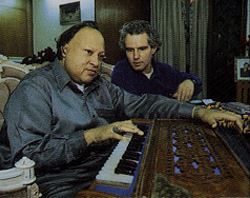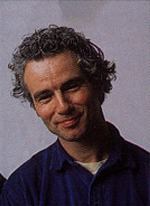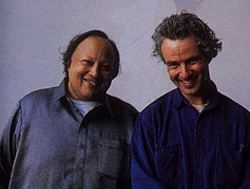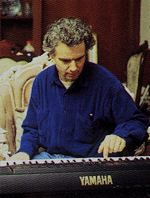 |
Nusrat Fateh Ali Khan and Michael Brook
from Real World Notes 2
by David Toop, Spring 1996
[archived here without permission]
Under a clouded night sky in Lahore, 10,000 spectators throng the circular Gaddafi Stadium, all caught in the grip of musical ecstacy. Chanting and dancing, they are anticipating the arrival on stage of Nusrat Fateh Ali Kahn, the 47 year old singer currently making the transition from national treasure to worldwide celebrity. All around me, men and women have been falling into trances, the wilder ones being dragged out of the arena by groups of soldiers. Now the build up to the main event begins in time honoured fashion. "The greatest music star in Pakistan" bellows the MC, who then launches into a list of some of the films that have used Nusrat's devotional songs in unlikely and sometimes controversial settings: The Last Temptation of Crist, Dead Man Walking, Bandit Queen and Natural Born Killers.

The following day, still reeling from the intensity of the concert, I attempt to find some logic in the many contradictions raised by the congenial, reserved and rotund Khansahib. Nusrat lives in the expensive Lahore suburb of Faisal Town , his house guarded day and night by a uniformed guard armed with a machine gun. Inside, the music room walls are hung with photographs of Nusrat in the company of rock star Peter Gabriel, the inevitable Imran Khan, General Zia and other notables. Despite random power cuts, constant visitors and the shrilling of mobile phones, the peaceful atmosphere offers a respite from the noise barrage of car horns that rages in the street outside.
For many years, Nusrat was a frequent flier, performing concerts and recording cassettes for Pakistani and Indian fans living in all corners of the world. His association with Peter Gabriel's Real World Records and the Womad festival, however, saw a new phase in his career. World music's audiences were stunned by the passion and energy of Qawwali, the devotional music form of which Nusrat Fateh Alik Kahn is regarded as the greatest living exponent. For a while, Peter Gabriel's commitment to Nusrat seemed almost an indulgence. Now, the steady stream of releases and concert appearances is paying off. Two songs recorded with Pearl Jam's Eddie Vedder have been acclaimed in America as highlights of the Dead Man Walking soundtrack and a duet with Björk is being mooted. Meanwhile, Night Song, the new album produced by Canadian guitarist Michael Brook, proves that religious and musical traditions can survive and develop without compromise in the digital age.

Some of the puzzles created by such developments are difficult to fathom. I ask Nusrat how he is able to negotiate such a bewildering maze of musical styles: one week in India recording Bollywood film songs, then off to Wiltshire to lay vocals over Brook's version of ambient, rock and trip-hop, then another week in America with Vedder, singing country-tinged ballads with slide guitars, then back to the home crowd in Pakistan for lengthy performances of traditional Qawwali. "Because I have the basic knowledge of classical music and I have learnt all styles," he says, "there is no diffficulty in adjusting. This is part of my family tradition." Not completely satisfied with this answer, I ask Brook for his impressions. "I think we can't map our idea of the sacred and profane on the way he thinks about it." Brook says, "He's not exactly spreading the word, but he's spreading the sacred music. There's no such thing as bad publicity."

Nonetheless, Nusrat is discerning about his collaborations. He sings with consistent fervour and astonishing technique, although a cassette of his music that I purchase at Karachi airport turns out to be a fairly resistible home-grown hybrid of lugubrious synthetic strings and crude drum machine programming. Perhaps one of the keys to this versatility is the Sufi religion itself. Qawwali is a musical and poetic expression of Sufism, the mystical and, in certain respects, relatively liberal branch of Islam. The aim of the music is to elevate the audience to a spiritual plane. To this end, there is no substitute for hearing Qawwali in concert. For the boisterous crowd in the Gaddafi Stadium, Nursat and his group of vocalists, percussion and harmoniums launched straight into a short set of greatest hits to create immediate frenzy. Two night earlier they had performed to an invited audience of aficionados - although not, as it was rumored, the Princess of Wales. With the original venue waterlogged by heavy rain, the substitute hall turned out to be a characterful decrepit cinema hidden within the city's maze of dark, winding streets. Here, the poetic elaborations were developed at a more subtle pace, the ecstatic repetitions burning on a longer fuse.

One question arises without fail when religious music is performed to audiences from other faiths or no faith at all. What can the music possibly mean when plucked out of its original context? "The message of Qawwali is not only for Muslims," Nusrat says. "There have been very great people in all religions. Christians, Hindus, Sikhs, they all had good Sufis. The message of the Sufis is the same - how to reach God - but they all have different ways." So Sufism can be seen as a flexible, humanitarian belief system that sits at the core of a variety of musical practices. Nusrat appears to be aplying this attitude to music, using a rhythmic and melodic virtuosity over Massive Attack's urban dub or Bally Sagoo's Asian hip-hop. The integrity stays intact becuase he is able to convey an unusual intensity of feeling to audiences, no matter how wide the linguistic and cultural gap.
In Pakistan, tension is rife. At one extreme is satellite television, featuring a flood of increasingly erotic film music clips from India; at the other extreme, the hardline mullahs condemn all singing and dancing as contrary to Islamic beliefs. With unshakeable devotion to the idea of music as spiritual expression, Nusrat sails on a wave of global popularity through these hazardous waters. As an improviser, he ranks alongside jazz greats such as John Coltrane, but his chameleon-like ability to blend into all environments places him at the forefront of music-making. "What I have to do is ensure that the beauty of the work does not get destroyed," he says, "but at the same time the new generation gets the message too. That is a lot of work."